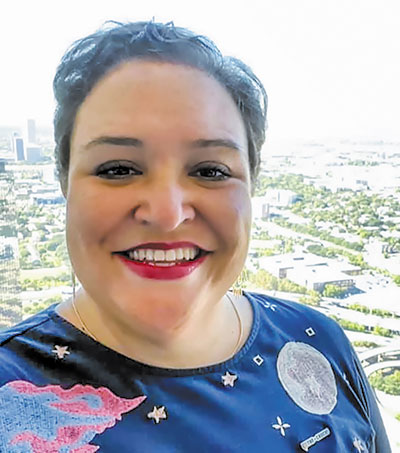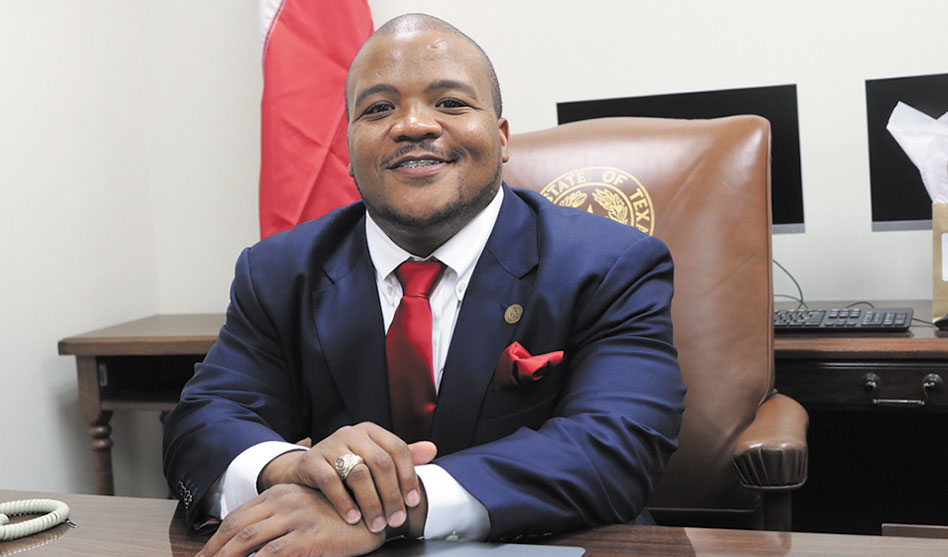State Rep. Venton Jones is the first openly HIV-positive person elected to the Texas House
Groups from across the state will converge on Austin to lobby lawmakers
DAVID TAFFET | Senior Staff Writer
taffet@dallasvoice.com
Rep. Venton Jones — the first member of the state House of Representatives who is out about his HIV-positive status — is already making a difference in the Texas Legislature, advocate Januari Fox, the policy, advocacy and community engagement director for Prism Health North Texas, said this week. “Venton,” she added, “brings something different to the table.”
Jones has filed legislation on HIV/AIDS issues, and Prism Health North Texas is sending a bus to the Capitol on March 27 to lobby for the bills he’s filed. Fox said participants will be most focused on HB 2235, which would make an HIV test part of a standard STD screening in Texas.
Currently, you have to ask your doctor to add an HIV test, or your doctor has to ask if you’d like to include it, Fox said. To ask for an HIV test, you have to know it’s not automatically administered and be comfortable enough with your doctor to ask for the test.
Doctors, on the other hand, generally don’t routinely include an HIV test for all patients but instead make assumptions about who needs the test.
Fox said that leads to many missed opportunities to catch HIV early.
“We’ve got all the tools,” she said. “We just need to start using them and get past the stigma.”

Januari Fox
This bill isn’t as controversial as other legislation, so, Fox said, she’s hoping Advocacy Day will help push the bill to get a hearing in committee and maybe get it to the House floor. But she acknowledged bills often take multiple sessions before they become law.
Jones was assigned to the Public Health Committee, so that increases the chance of a hearing on the bill.
Another bill Jones is planning to file is a decriminalization bill.
“HIV is in criminal statute now for transmission,” Fox said. “It’s considered assault.”
Last session, one bill would have increased the penalties for transmitting HIV by upgrading it to aggravated assault, making it a felony. That bill died in committee.
Criminalization is something we hear about when someone with HIV spits at a medical worker. But, Fox said, “That doesn’t match up with the science. It’s not how HIV is transmitted.”
And, she added, “HIV is not a death sentence. It’s a treatable, manageable, chronic disease.”
Jones said she is trying get HIV removed from the criminal code altogether.
Then there are budget items. During the pandemic, the ADAP program, which funds HIV medications for those who don’t have insurance and can’t afford the medication, had a $36 million deficit. Fox said it was a combination of money getting shifted around to deal with COVID as well as an ordering glitch.
Another issue is the recent approval of Cabenuva, a once-every-other-month injectable treatment for HIV. Fox called that medication groundbreaking. An injectable helps anyone who has trouble staying compliant with daily medication, those who don’t want the sigma of having bottles of medicine around their house, the homeless who have no place to store medications and others, Fox said.
But Cabenuva is expensive, and HIV advocates are looking for funding from the state.
They’re also looking for a change in rules. Currently those participating in the ADAP program have to be re-certified as eligible every six months. The proposed rule would change that to once a year. The six-month renewal is a barrier to treatment for many because of transportation, child care, taking time off work and more.
Fox said Prism Health North Texas and other large HIV agencies across the state have people lobbying in the Capitol every week the Legislature is in session. They provide legislators with statistics and proposals so they have the facts about HIV.
Now, they have the additional benefit of having a colleague who is HIV-positive and who talks about it openly.
But lobbying day will bring people from around the state to Austin to talk to legislators about their own personal experiences.
Fox explained the schedule: Two virtual trainings will be held on March 9 and March 23, including a legislation 101 session and information on specific issues.
“We’ll stay laser-focused on HIV,” Fox assured.
On Monday, March 27, a bus will leave Dallas early from a central location where participants can park for the day. All costs will be covered.
Once in Austin, groups from around the state will meet at First United Methodist Church, a block from the Capitol, where breakfast will be served. Jones will give a rallying speech, and T-shirts will be distributed.
“We want to get over to the Capitol by 11 a.m. for a proclamation,” Fox said. She noted that when the LGBT Chambers of Commerce recently went to the Capitol, the proclamation welcoming them didn’t pass. She hopes for a smoother day than the Chamber members had.
Lunch and advocacy will follow. Everyone will be assigned to groups that will lobby together. No first-timers will lobby alone or even be expected to speak. Appointments will already be made for each group.
Fox said they’ll wrap up by 5 p.m.
“If you want to come for a first time and just watch the process, there’s no pressure,” she said. “We want to capture folks interested in these issues and develop them as advocates.”
What she’s seen happen is a newcomer will watch during the first office visit and then later in the afternoon become comfortable enough to tell their own story in another office.
HIV advocacy days have happened in the Texas Capitol since 2011. In 2021, advocacy day was virtual, so this is the first time lobbying is back in person, meeting legislators face-to-face, since the pandemic.

